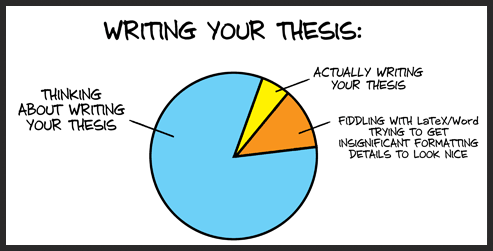Whether it’s a two-year MA or a longer PhD project, writing a thesis is no small feat. Dedicating yourself to a single topic from anywhere between nine months and six years is a pretty massive commitment that comes with its fair share of ups and downs. Knowing what kind of trials await you can certainly weather the storm, so here are a few things no on tells you about writing your thesis.
Your topic will change – and change again
When you said goodbye to undergrad, you said goodbye to irrelevant coursework. No more outdated theorists or lame methodologies – you’re a real academic now! You know what you’re going to study and how you’re going to study it, right? That is, of course, until everything changes.
The inspiration to shift gears can be as innocuous as reading an article that nudges your direction, or it can be the soul-crushing discovery that someone has already explored your exact topic, which usually results in a pretty quick 180. Once you’re done dealing with the total oblivion of your own unoriginality, that is.
Late nights will take on a new meaning
Did you know the library is open until 2am? Neither did I until I started my thesis. It’s funny how quickly the library’s postgrad space becomes not only your study, but also your kitchen, common room and occasional sleeping quarters.
You know a place is magic when it’s 1am and the guy to your left is binge-watching Pokémon while the woman to the right is programming artificial intelligence.
You will suffer imposter syndrome
Probably one of the worst parts of thesis life is developing an inevitable case of imposter syndrome. When sitting in a room full of postgrads, it can be really daunting to hear them speak with confidence about subjects you know very little about. The reality? No one has time to master everything. It’s important to remind yourself that they don’t let just anyone into postgrad research, and you’re there because you deserve it. Don’t sweat it; the only area you need to be well versed in is your own.

You’ll probably want to kill your supervisor
Full disclosure? My supervisor was a bro, but I’ve certainly heard of less favourable experiences. Look, your supervisor’s job is to make sure you’re turning in the best thesis you possibly can. When the deadline is fast approaching, receiving an email telling you to restructure a chapter or that you need more sources can have a pretty heavy impact. In the end you’ll thank them, but at the time you might consider the viability of finishing your thesis from behind bars.
As an expert on your topic, you’ll never want to talk about it again
For some, their thesis marks the first plunge into a niche area of study that they’ll spend the rest of their life exploring. For others, it’ll be remembered as the time they figured out exactly what to never study again. The other week I bumped into a member of staff who asked me if I was going to continue working with the texts I used for my thesis. This triggered some pretty nasty flashbacks.
In the end, you’ll wonder what you were so worried about
Whether it’s the nine-month sprint of a Masters of Research or the long slog of a PhD, you’ll probably experience all of the above. There will be long nights, hair-pulling edits, and weeks of work with nothing to show for it. But when submission day is over, you’ll look back and realise it was not only all worthwhile, but that you never had anything to worry about in the first place.
Reference:
Cameron Cooper: Edmond is a writer, musician and PhD candidate from Sydney. He teaches game design at Macquarie University. Following him on Twitter @CamCooperSpeaks.

Comments are closed.